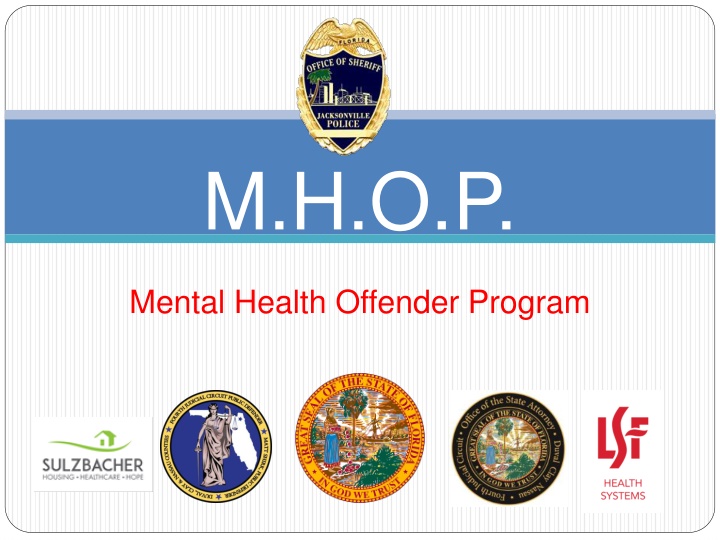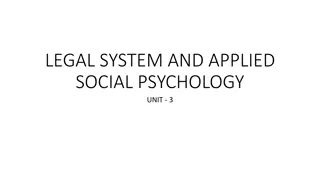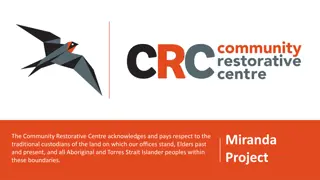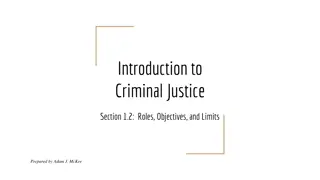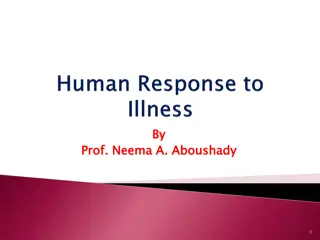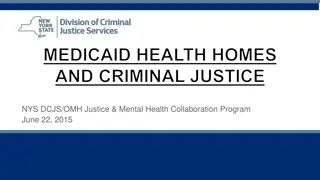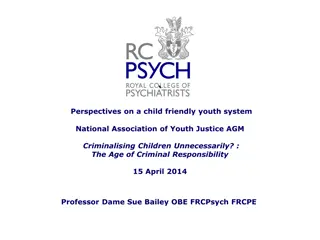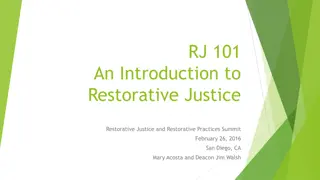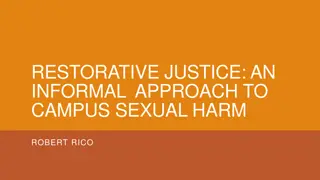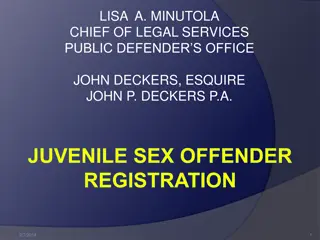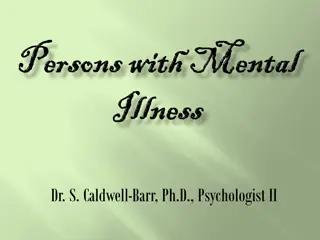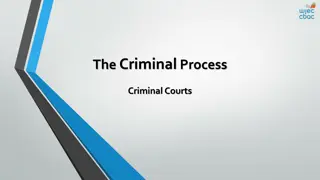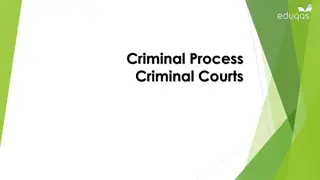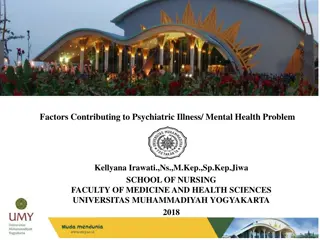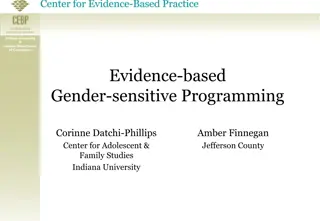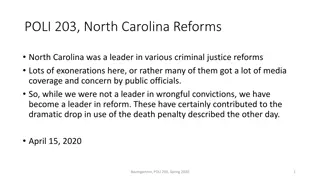Mental Health Offender Program: Addressing Mental Illness in the Criminal Justice System
A pilot program, M.H.O.P., aims to reduce the burden on the criminal justice system by providing pretrial release, personalized care plans, and court supervision for defendants with mental illness. By addressing the needs of the mentally ill, the program strives to break the cycle of criminal behavior and promote stability and responsibility. The initiative also highlights cost-saving strategies, such as permanent supportive housing solutions, to improve outcomes and reduce community expenses associated with mental illness.
Download Presentation

Please find below an Image/Link to download the presentation.
The content on the website is provided AS IS for your information and personal use only. It may not be sold, licensed, or shared on other websites without obtaining consent from the author.If you encounter any issues during the download, it is possible that the publisher has removed the file from their server.
You are allowed to download the files provided on this website for personal or commercial use, subject to the condition that they are used lawfully. All files are the property of their respective owners.
The content on the website is provided AS IS for your information and personal use only. It may not be sold, licensed, or shared on other websites without obtaining consent from the author.
E N D
Presentation Transcript
M.H.O.P. Mental Health Offender Program
Purpose A pilot program to reduce the demands on the criminal justice system by helping those with mental illness. The program will provide pretrial release from custody, a customized plan of care to stabilize defendants, and court supervision to ensure compliance.
Background (Community Costs) For mentally ill persons experiencing homelessness, the average cost to the community is $50,000 per person, per year. This includes jail time, emergency room visits, social services and other costs.* When a permanent supportive housing solution is implemented, the average cost to the community is 25% to 50% less (between $12,000 and $24,000) when coupled with the necessary wraparound services.
Background (Increasing Need) In the U.S., serious mental illness among jail inmates and prisoners is approximately 2 to 5 times higher than the general population.* Duval County Data (JSO): 2019: 925 people arrested with a mental health flag and 92 were homeless (10%) 2020 (through Sept.): 658 people arrested with a mental health flag and 242 were homeless (37%)
Program Summary Target population identified by JSO, State Attorney s Office, and Sulzbacher based on prior data Pre-trial diversion program Criminal Justice system & Sulzbacher Center administer Restore mentally ill individuals from criminal cycle to stability and personal responsibility
BUDGET / EXPENSES: Personnel: Request: Sulzbacher Match .75 Mental Health Jail Initiative Coordinator (to be housed at Courthouse) New Hire $50,000 $0 .4 FTE Psychiatrist @ $136,670 to devote time to working with individuals suffering from mental illness in this program = $54,668. Of this total, $27,334 is requested from this grant and $27,334 will be matched from Sulzbacher's HRSA grant. $27,334 $27,334 .5 FTE Psychiatric ARNP @ $100,000 to work with persons suffering from mental illness in this program. New Hire $50,000 $0 1 FTE Intensive Case Manager @ $32,000 to provide intensive case management and linkage to services for clients in this program. New Hire $32,000 $0 .75 FTE SOAR Processor @ $40,000 to provide linkage to benefits for clients. New Hire $30,000 $0 .75 FTE Peer Support Specialist @ $30,000 to provide ongoing support and counseling for clients. New Hire $22,500 $0 .25 Gateway Substance Abuse Counselor (contracted by Sulzbacher) $0 $20,000 .25 Goodwill Job Counselor (contracted by Sulzbacher $0 $15,000 $62,334 Total Personnel: FRINGE Benefits @ 26% Total Travel: Total Equipment: Total Supplies: Other: $211,834 $21,970 $3,225 $4,900 $0 $0 $0 $0 $71 Request: Housing through vouchers or other sources, figured at $800 per month x 9 months x 20 clients = $144,000. $144,000 $0 Hotel costs for up to two weeks per client until they are placed in permanent housing, figured at $300 per week x 2 weeks x 20 clients in one year = $12,000. $12,000 $0 Food vouchers for program clients until they can be connected to income or Foodstamps. Figured at $100 per client x 20 clients = $2,000. $2,000 $0 Pharmaceuticals (will supply all necessary Psychotropic and other meds) approx. $1000 per patient per year $0 $20,000-40,000 Total Other: $158,000 $20,000 - 40,000 $82,334 - $102,334 TOTAL EXPENSES: $400,000
Participating Agencies Duval County Judges State Attorney s Office Public Defender s Office Jacksonville Sheriff s Office Sulzbacher Center Lutheran Services of Florida Gateway Community Services
Program Scope Number of Participants: 20-40 Length: 9 month pilot Requirements Conformance to Sulzbacher Center rules, compliance with mental health case plan, court supervision, and housing lease (if applicable). Violations Reported to Court during supervision. Services mental health treatment, free prescriptions, intensive case management; substance abuse treatment and scattered site housing (if needed); Wraparound services: job placement, SOAR processor for SSI/SSDI, peer specialist, and other supportive services as needed
Target Population JSO Crime Analysis Unit (CAU) Number of Arrests Type of Arrests Mental Health Flags CAU Referral Sends report to the Sulzbacher Center to review and select candidates The Sulzbacher Center JSO Pre-Trial Services notifies Sulzbacher Center when candidate is arrested Sends prospective candidates to State Attorney s Office for approval Informs JSO
MHOP Process Overview Target Population Eligibility Criteria Defendant Arrested, Identified, and Screened Defendant Referred to Judge for Approval and Release Sulzbacher Staff Transport Defendant Defendant Stabilized and Assessed by Clinicians Defendant s customized plan of care and pretrial diversion proposal is presented The Sulzbacher Center will supervise Defendant and provide all critical services Scope of Services
Reported Outcomes Taxpayer Savings: arrests, jail time, CSU and hospitals admissions Reduction in Homelessness Decrease in Recidivism Increase Substance Abuse Treatment and Recovery Income Attainment via employment and mainstream benefits
Collateral Community Benefits Conservation of JSO resources Conservation of JFRD resources Reduction in demands on law enforcement for low level offenses thereby increasing resources for violent crime reduction Improved criminal justice system collaboration Restoration for mentally ill defendants Increased capacity and safety for Pre-trial Detention Facility inmates and officers Reduction of crime incidents and victimization
C.H.O.P. Study 12 months pre and post entry into program 23 client sample Arrests 62% (67 to 26) Costs ($59,228 to $22,984) Days in Jail (871 to 182) Costs ($53,131 to $11,102) Crisis Stabilization Unit Admissions (28 to 0) Costs ($10,556 to $0) Total costs dropped from $122,915 to $34,086.
Incidents 62% Decrease
